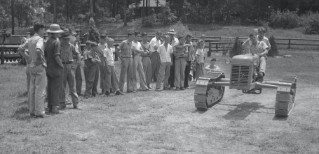History
In 1859, before there were tractors, television or even the 20th century, there was the University of Georgia College of Agricultural and Environmental Sciences. It has become the university's strongest arm to carry out its land-grant mission through a three-part structure of teaching, research and extension. Even from its earliest days, the college has worked hard to support Georgia's No. 1 industry: agriculture.
The heart of the college beats in its classrooms. The college offers 22 majors, four undergraduate degrees, four masters degree programs, and doctorates in more than 10 areas.
Students graduate ready and able to tackle careers in agriculture and environmental protection on a regional, national and international level. Unlike the first graduates back at the turn of the century, few of today's graduates enter farm production careers anymore. More than half pursue careers in business, with both agricultural and non-agricultural firms. Other graduates are employed in government, environmental protection, education, management, finance, research, processing and manufacturing.
For more than 100 years, the Georgia Agricultural Experiment Stations have conducted research to benefit all Georgians. Agricultural experiment stations, located in every region of Georgia, cover every ecological, environmental and socioeconomic area of the state.
Scientists at three main research campuses, five branch stations and a research farm replicate experiments under varying geographic and climatic conditions across the state. Scientists have developed equipment, like the peanut combine and the onion harvester; and grown new profitable crop varieties like Georgia Green peanuts, Georgia King cotton and Tifton 85 bermuda grass. They investigate new technologies like freeze preservation of foods. They study the feasibility for new crops in Georgia like carrots and Vidalia onions; and support new fast-growing industries like ornamentals and turf.
The UGA Cooperative Extension Service was founded in 1914 to take research-based agricultural information to the people. County agents and specialists throughout the state share information on issues like water quality, profitability in agribusiness, family wellness and life skills. County agents test soil and water, advise on safe pesticide use, provide publications and computer programs and teach consumers skills to improve their quality of life. They are the local experts in food safety, proper eating habits, child safety, and parenting.
The Extension Service coordinates Georgia's largest youth program, 4-H. Each year, almost 200,000 young Georgians participate in community projects, summer camps and conferences on today's issues while having fun and learning to work together. The leadership skills and responsible values they learn in 4-H last a lifetime.







